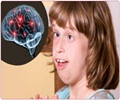Research has pointed out that children suffering from epilepsy should be screened systematically for developmental delays and autism.

According to Anne Berg and Breanne Fisher of the investigative team, "The yield of screening in the EMU setting for developmental and behavioral comorbidities is sufficiently high to support routine screening of both new onset and established cases of pediatric epilepsy. Our findings also suggest that all children seen in the epilepsy clinic should be screened for these comorbidities."
The study was conducted among children under age five seen between November 1, 2010 and May 15, 2011. Parents were asked to complete the developmental screening instrument (Ages and Stages Questionnaire, ASQ) and one of two autism screening instruments used in the study. No child screened positive for autism alone.
The investigators have now focused the program on evaluating the prospective use of a more extensive battery of screening tools with new-onset patients followed over time.
Editors Note: Authors of this study will be available at a press briefing at 9:30 am, Monday,
December 5 in the onsite press room, Room 336, of the Baltimore Convention Center. Briefing call-in number: 1-866-740-1260; PIN 5867508#
About the American Epilepsy Society (AES)
The American Epilepsy Society, based in West Hartford, CT, seeks to advance and improve the treatment of epilepsy through the promotion of research and education for healthcare professionals. Society membership includes epileptologists and other medical professionals, allied healthcare professionals, and scientists concerned with the care of people who have seizure disorders.
Advertisement
Source-Newswise













